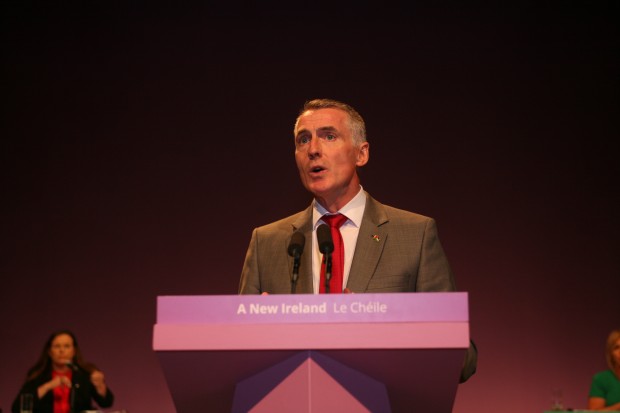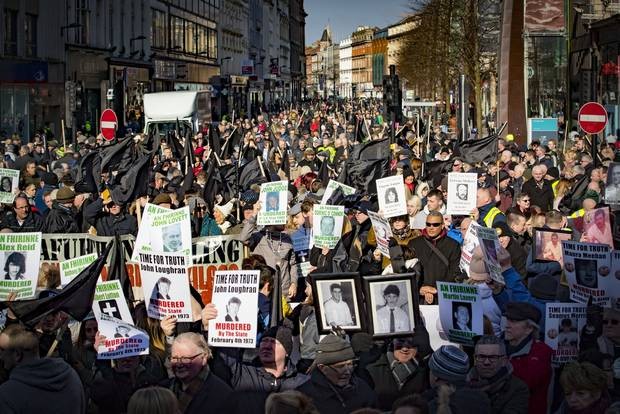5 October 2018
It is now time to finally deal with the past - Declan Kearney

"The past cannot be changed, nor can our shared hurt, suffering and pain be undone. While there may never be agreement on the various contested narratives of the past, these must all be respected and acknowledged." - Declan Kearney
This week the NIO consultation on dealing with the legacy of the past in the north of Ireland closed.
It will inform a legislative process and bring forward future legacy legislation.
Failure to deal with the past remains one of the most significant impediments to political progress here.
It is a barrier to the development of a comprehensive reconciliation and healing process in this society.
British state policy has been the primary factor in preventing legacy issues from being addressed or resolved.
Powerful sections of the British military and intelligence system have never embraced the peace process. They remain psychologically and politically locked into a conflict mind-set even twenty years after the Good Friday Agreement was signed.
The role of British State forces and their agents, a refusal to acknowledge and be accountable for their actions, combined with a disregard for successive binding court rulings, has defined the British state’s approach to legacy matters.
That has been reinforced in recent times by a cynical and false narrative, including interventions by the British Prime Minister Theresa May, and British Secretary of State in the north, Karen Bradley, to suggest that only state forces were being made subject to legacy investigations.

These statements are offensive and wrong, and are an egregious demonstration of the partisan nature of British policy towards dealing with the past.
They are consistent with the British practice of denying wrong doing, concealing the truth, and preventing accountability.
This poses a major challenge to ensuring that a robust, independent, and impartial facilitation of the legislative process will emerge from this consultation on addressing the legacy of the past.
All sides suffered, and caused suffering to each other during the conflict.
There are multiple narratives regarding our tragic past. There is no single narrative despite the attempts of the British state and political unionism to assert otherwise.
The past cannot be changed, nor can our shared hurt, suffering and pain be undone. While there may never be agreement on the various contested narratives of the past, these must all be respected and acknowledged.
The Stormont House Agreement, 2014, (SHA), set out an agreed framework of legacy mechanisms which provided an unprecedented opportunity to comprehensively deal with the past in all its aspects.
Subsequent draft legislation reneged on the British government’s obligations under the SHA by introducing a national security veto, which had the effect of blocking a way forward on the issue of legacy.
Full implementation of the SHA on a human rights compliant basis presents the best opportunity to deal with the legacy of our past and guarantee a framework which is victim centred.
Facilitation of any future legislative process will require that the British government must ensure all victims are treated with equality, respect and dignity; that the legislation reflects the policy intent of the Agreement; and, that the legacy architecture is fully independent, human rights compliant, and properly resourced and funded.

The following key principles should be central to the operation of future legacy legislation and mechanisms.
- All processes should be victim centred
- All processes must secure the co-operation of all relevant parties to ensure success
- All processes should be based upon equality, respect, and dignity
- All processes must be free from political interference and be absolutely independent
- Acknowledgement should be central to the operation of the legacy framework
- The aim of that framework should be to enable reconciliation and healing within wider society
If there is to be a collective and comprehensive engagement with the past in a human rights compliant manner, there can be no hierarchy of victimhood or humanity.
There must be no change to the definition of a victim.
High-quality services should be provided to all victims at the point of need.
This should extend to the immediate provision of a pension for all seriously and psychologically injured during the conflict.
The British Government should also immediately release the required funding to resource the Lord Chief Justice’s inquest plan, as a separate distinct process from any new legacy mechanisms.
The Office of the Police Ombudsman should be adequately and immediately resourced.
Any attempt by the British state to introduce a statute of limitations to protect its forces and agents would be a violation of the SHA and must be opposed.
Full participation and unfettered disclosure by British state forces and its agents with the legacy mechanisms will be essential to achieve full public confidence in their ability to deliver on behalf of all society.

Periodic reviews should be carried out to inform the extent of funding requirements and necessary timeframe, for all legacy mechanisms.
Legacy processes should not be limited or impeded by closed material proceedings. In addition, for future legacy mechanisms to function as intended, it is essential families are given full access to legal aid.
The legacy legislation which ultimately emerges from the consultation must comply with the policy intent of the SHA by:
- Promoting reconciliation
- Upholding the rule of law
- Acknowledging and addressing the suffering of all victims and survivors
- Facilitating the pursuit of justice and information recovery
- Being human rights compliant
- Being balanced, proportionate, transparent, accountable, fair, and equal
The full implementation of that Agreement represents the best potential and opportunity to address the legacy of our political conflict and the suffering experienced by everyone during the conflict in Ireland, Britain and beyond.
So, it is now time to finally deal with the past. It is time to build for the future. It is time to lay the foundations for reconciliation and healing, and to open up a new phase of the peace process.
Follow us on Facebook
An Phoblacht on Twitter
Uncomfortable Conversations

An initiative for dialogue
for reconciliation
— — — — — — —
Contributions from key figures in the churches, academia and wider civic society as well as senior republican figures





